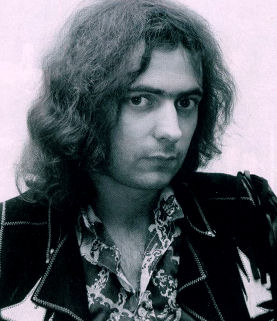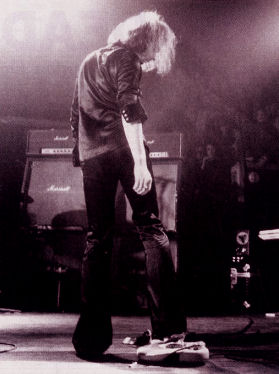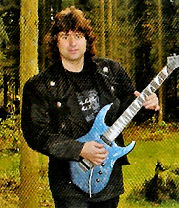|
Ritchie Blackmore Dear Guitar Hero DON'T BE SHY G'AHEAD... ASK ANYTHING He wrote the most famous riff in hard rock and then made a name for himself on the renaissance-rock circuit. But what Guitar World readers really want to know is...  I believe you were the first person to scallop the neck of your guitar. What inspired you to do so, and do you have anything similar done to your acoustic guitars?
I believe you were the first person to scallop the neck of your guitar. What inspired you to do so, and do you have anything similar done to your acoustic guitars?-Steve Athey I first did this when I was 18 after playing an old guitar whose neck was so pitted that it had a scalloped effect. I liked it so much that I sandpapered the wood between the frets, and I loved the results. The scallop makes holding a bent note easier because the string does not get caught up. I also find it gives me more control over the vibrato. My acoustics are custommade by a few small luthiers, and I have had some of the guitars scalloped, though it is less essential on acoustics because, when playing them, I rely on trills more than bends. You are a virtuoso guitarist, yet you are most associated with "Smoke on the Water," one of the all-time simplest and coolest riffs. Are you surprised that riff has had such a lasting impact? -Carmen Davis Yes, and no. I am kind of surprised so many people jumped on it, when there are so many other riffs that I think are better, but it pays the bills, so I don't mind. I was trying to write something simple. When I first started writing music, I listened to people like Pete Townshend and marveled at how simple and catchy his music was. I was following that route with "Smoke on the Water." Writing something banal but catchy is an art in itself, one that is often more difficult than writing a complex piece with many parts. I have long marveled at your ability to keep your Strats in tune, given your style of heavy bending and tremolo dives. Do you have any tips or tricks you could share? -J. Todd Indeed I do. Leo Fender made Stratocasters with an extreme angle for the tailpiece-it's nearly 45 degrees, I believe-and setting it as such makes all the difference. If done so with the right amount of springs, the trem unit will always return to being perfectly in tune. I didn't believe this until the guy who fixed my guitars showed me. He would correct the action only about once every six months. I called Fender to tell them, and they knew absolutely nothing about it. They just assumed tremolo units went out of tune. Does it anger you that Yngwie Malmsteen made the inclusion of classical music in rock look ridiculous? -Justin Davis No, not at all. Yngwie is a very good player. He is much better than people give him credit for. I think his wardrobe might bother me more than his playing. I've always loved how the organ and guitar solos meshed in Deep Purple, especially on "Burn." How closely did you and [keyboardist] Jon Lord work out your solos? -name withheld We worked very closely, because we typically went into a song understanding we would each take a solo. Generally, we would each write out the progressions we wanted to solo over, and then show them to each other. On "Burn," we sort of swapped solos. I was having a very hard time with the progression I had written for myself, but Jon liked it, so he took it over for his solo and I wrote a new one for myself. Your rock playing has always had a jazzy feel in that it is laidback but in the pocket. What jazz players influenced your playing and/or phrasing? -Dustin Ehrlich When I was 15 I went through a jazz period centered around Wes Montgomery and the amazing Django Reinhardt, but I came out of it quite quickly. I really don't like jazz. I was always more into classical, country and renaissance music. I do love jazz drummers, though, and prefer to play with them rather than rock drummers because they have a lighter touch and subtler feel. You had such a great rock sound. What were you playing through on Machine Head? -Michael Curry I was using a 200-watt Marshall with a treble booster, probably a Hornby Skewe, but I can't say for sure which Strat I was playing. For one thing, I used to change the necks on my guitars often because I might like the feel but not the sound. I also glued necks in place so they couldn't move. For such a seemingly simple riff "Smoke on the Water" is played many different ways. So which method is correct: power chords or single-note passes? -John Paradis It's played with two notes picked at the same time, using fingers rather than a pick. It sounds wrong when strummed as a chord or picked with all downstrokes. The bass part of the riff is plucked downward with the thumb while the finger is pulling up. I pick the fourth and fifth strings together on the fifth fret, then I pick the third and fourth strings on the third fret. The next shape is on the same two strings on the fifth fret, then the semitone above that, and then back to the first two shapes. Is your guitar in standard tuning or down one half step? -James Bettis I always tuned my electrics to standard pitch, in part because I played with keyboardists. I find, however, that the acoustic guitar screams a little bit when tuned to concert pitch, so I prefer it to be a semitone under. What one thing in your rig has remained the same through the years? -Sean Oster My tape recorder, which I converted into a preamp in '72. We've tried to emulate that sound with a million different pieces of gear, none of which sounded right. So I've continually carted around this big tape recorder that is falling apart. Finally, some German guy made me a little box that seems to replicate the sound; it flattens it and fattens it up without fuzzing it up. That is now my backup and one of these days may actually replace the irreplaceable.  You once categorically stated that "Eric Clapton is not a very good guitar player" Why would you say that, especially since he gave you your first Stratocaster?
You once categorically stated that "Eric Clapton is not a very good guitar player" Why would you say that, especially since he gave you your first Stratocaster?-Marion Cortes Those were not my exact words, and I regret that what I said came across as a put-down; that's not how I meant it. Eric is very good, but it's amazing that so many other guitarists are forgotten about or never known. That's the point I was trying to make, that there are a lot of other brilliant guitarists. Eric has done a lot for the guitar, especially with some of his work with Cream, and he certainly did a lot for me by turning me on to Strats as well as Clifford Essex strings. As for him giving me my first Strat-actually, he gave it to his roadie, who sold it to me. And in '68, when Deep Purple supported Cream at the Forum in Los Angeles-with Jimi Hendrix and George Harrison in the first row-I asked Eric backstage what kind of strings he used, because I loved his sound. Am I crazy to think that Jimi Hendrix is overrated? His blues-based playing could not hold a candle to your work. -James Howard You are not crazy but you are wrong. That said, I understand what you are getting at. Although I loved Hendrix's playing, I could see the limitations. He was the best in terms of the overwhelming feel of his playing, arrangements and riffs, and the way his guitar and voice were as one. But from a technical point of view, it wasn't overwhelming, and I think Robert Fripp thought the same. I loved listening to Hendrix play, because he was an extension of the guitar, and it was amazing how he would just make the thing sing. His was a very different approach, and it really made me pause, because I focused on technical players like Chet Atkins, Les Paul and Speedy Bryant. When Hendrix came along, I thought, What is happening here? What led you to become fascinated with classical chord progressions and harmonies? Did any particular composers excite you? -Alan Jones The main composer who inspired me was obviously Bach, who had a rock and roll sound on some of his organ pieces. The guys who turned me onto the concept were the guitarists Joe Moretti and Tony Harvey of Nero and the Gladiators. I saw them play at a community center when I was 15 and was blown away. They did "In the Hall of the Mountain King" and other classical pieces, and it really grabbed me. I started fiddling with classical pieces right then. What is your most recent Blackmore's Night release? And will you ever make it to the West Coast? -Rita McKinney Actually, we're coming this winter for the first time. We're looking at vineyards and other interesting outdoor venues, which we prefer to rock clubs. Our most recent release is a compilation, Beyond the Sunset, which we put together largely for people to play at their weddings, since we get such requests so often. Have a look at my web site, blackmoresnight.com, for more information on the album and upcoming tour. Is it true that you were planning a reunion gig with all the old Deep Purple members, including David Coverdale and Glenn Hughes? -Olli Hirvonen Not that I know of. No one has told me of such an event. Did any of you guys ever kick Frank Zappa's ass for running away from the fire in Switzerland [recounted in the lyrics of "Smoke on the Water"] ? -Ample Al No, we didn't. Though it was funny how he told the audience to calm down then proceeded to jump out the window. You've just woken up and found yourself in the middle of the 16th century. Who is the first person you want to jam with, and will you be able to find musical currency? -RemiAudy My favorite composer is Tillman Susato, so I would hunt him down in Antwerp in the 1530s. He was a music publisher as well as a musician, so he would have lots of Flemish pageantry-style music. I'm not a good reader so it might be a little tricky to play immediately, but I would pick it up by ear and have a grand old time. © Guitar World, March 2005 Jürgen Blackmore Perfect Strangers His father may be Ritchie Blackmore, but Jürgen Blackmore is no fortunate son  In a few years Wolfgang Van Halen may want to ask Jürgen Blackmore for advice on how to carry a burden few will ever know: life in the shadow of a famous father. The son of Deep Purple guitarist Ritchie Blackmore, Jürgen has made a point of writing his own music and developing his own playing style, only to find the music industry wants him to be a copy of the original.
In a few years Wolfgang Van Halen may want to ask Jürgen Blackmore for advice on how to carry a burden few will ever know: life in the shadow of a famous father. The son of Deep Purple guitarist Ritchie Blackmore, Jürgen has made a point of writing his own music and developing his own playing style, only to find the music industry wants him to be a copy of the original."I've been living up to my father's legacy my whole life, and I hate it," he says. Born in England in 1964, and raised in Germany, Jürgen was just four when his parents separated. Since then, he and his father have been in contact sporadically. "I'd see him when he played in Germany, but there were always other people around. I don't feel comfortable calling him because I don't know him very well." In 1990, Jurgen released his first album, the J.R. Blackmore Group's Still Holding On, but he quit the music scene soon after. "I got tired of people telling me what to do. The industry just wanted to use and abuse me because of my name." Now, after more than a decade, Jurgen is back with a new all-instrumental EP, Recall the Past (available through jrblackmore.de). The album is a showcase for his dramatic, expressive guitar work. "I describe it as movie soundtrack music with guitar on top," he says. Blackmore is excited to be back on his feet after a long hiatus, but what he wants most is a relationship with his dad. "I'd love to be alone with my father and go fishing or something. That would be great." © Joe Lalaina, Guitar World, March 2005 |